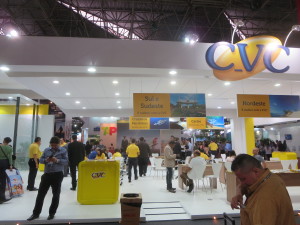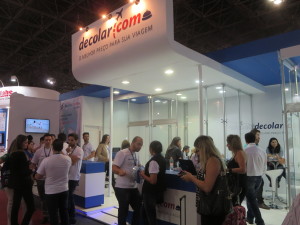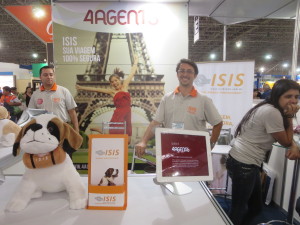See also: ABAV Day 1 | Day 2 | Day 3
ABAV is the Brazilian Association of Travel Agents, and ABAV has wrapped up its great shebang of a 42nd annual congress just this last weekend in São Paulo’s city-within-a-city Anhembi convention center. But this was not exactly your father’s annual ABAV convention.
Brazil’s snappy and still youthful Windsor Hotels were present and accounted for. So was Brazil’s more vintage Othon Hotel group. But where was the Copacabana Palace? Caesar Park? Fasano? The Brazilian Accor people, with their dozens of Brazilian properties, 76 of them in São Paulo State alone? It used to be that hundreds of little Brazilian pousadas, or inns, also had stands or tables. But they, too, were largely gone. Presumably, a good many pousadas had simply eliminated the ABAV congress and the ABAV exhibition floor from their marketing plans.
Not that the exhibition floor was empty. Quite the contrary. It teemed. The Brazilian states had large institutional stands that served as umbrellas for many a local tourism authority and also for numerous local operators. Sixty-five countries beyond Brazil’s borders, Norway to Indonesia, made their presence known, some with modest flash, some with a lot of flash. The airlines, both the Brazilian ones and numerous foreign ones, were present in great force. And likewise the car rental companies. Services of every conceivable kind.
Booking.com occupied a substantial stand. As did Groupon. As did Decolar, which is a pan-Latin American on-line reservation service. And Hotel Urbano, which is a Brazilian on-line reservation service. But, from the travel agent’s perspective, wasn’t this the competition, or even the enemy, right inside the citadel?
Asked as to whether ABAV hadn’t opened the door a little too wide to the Trojan horse, ABAV officials tended to shrug. “It’s reality,” one spokesperson said.
Decolar at least was trying to make nice on the flesh-and-blood travel agents. Decolar, which purports to be the largest travel agency in Latin America (in the Spanish-speaking countries, it is known as Despegar.com), availed itself of ABAV for the official launch of its Afiliados Decolar — or Decolar Affiliates — program. Brick-and-mortar agencies were invited to put their own logos up in place of the Decolar logo on the Decolar Web site, with commissions to be shared. In advance of this official launch, 1,200 Brazilian agencies had already signed on. At the ABAV congress, additional agencies were signing on, according to Decolar executives, at the rate of 50 a day.
Groupon took a harder line. Pamela Forti, a spokesperson for Groupon’s Brazilian operation, said, “Really, we’re not here to deal with the agents. We are ourselves a travel agent. We are here to talk to our partners, specifically the hotel people, restaurateurs. And to the general public, too, of course.” Hotel Urbano was similarly little interested in their flesh-and-blood travel agent hosts.. Booking.com’s utter lack of interest in stroking flesh-and-blood agents can be imagined.
A footnote is needed here. Wednesday to Friday, ABAV proceedings were open to professionals only. But this year the general public was to be welcomed to the exhibition hall from 2 p.m. to 8 p.m. on Saturday and Sunday at a charge of R$18 per person or R$35 for a family of up to 4 persons. (R$18 = US$7.40.) This was not strictly speaking the first time that the ABAV exhibition hall had been opened to the general public over a weekend, but it was the first time that the event was being heavily advertised and publicized, and discounts were to reach the 70% level.
An eight-day Turkey package including air, 5-star hotel, transfers and guides, usually going at US$3,850 ppdo would now go for US$1,100 ppdo.
Four nights in Mendoza, the Argentine wine center at the foot of the Andes, including air, hotel, breakfast, and vineyard tours, would go for US$499 ppdo.
Seven days in South Africa including air and lodging would go for $400 ppdo.
These are the deals that were in the releases, and I was repeatedly assured that, however incredible they sounded, they were not misprints.
CVC, Brazil’s great supermarket of a travel agency, with 800-plus travel “stores” in cities and towns and hamlets from up on the Venezuelan border in the north to the Uruguayan border in the south, many of these stores in shopping malls, was to have a mini-army of agents on hand to answer questions, and they would also have credit-card processors. Money was going to change hands.
Other operators were also gearing up for the anticipated weekend onslaught.
An ABAV curiosity: The stand of Israeli tour operator Vered Hasharon was separated from the Holy Land Incoming Tour Operators Association, a Palestinian organization, by a paper thin partition. ABAV making mischief? ABAV playing a peacemaker role?
“We asked to be next to them,” said Vered Hasharon’s Shay Rosenstein. “We’re selling similar products. If you’re in the shoe business and you’re looking for a place to put a store, where do you want to locate? You want to locate on a street where there are other shoe stores. Same with us.”
But what was the Islamic State of Iraq and Syria doing at ABAV? ABAV’s ISIS turned out, up close, to be in the medical insurance business for student travelers. Thinking of changing their name to avoid confusion? No, we like our name, we were told. We don’t think there will likely be a lot of confusion.
Interesting talk by former Embratur President Eduardo Sanovicz on the question of Brazil’s hordes of first-time travelers. First-time travelers may not be much of an issue in the U.S., but in Brazil, where much of the population grew up in the mule cart era, air fares nowadays are for the first time competitive with bus fares, and this means that the immigrant who 20 years ago came south in search of work in an arduous week-long journey by bus or even on the back of a truck, say, from the Northeastern state of Paraíba, now gets back home to visit family in just a matter of hours. But often luggage allowances are hard to decipher, check-in procedures are baffling, and the situation is all the worse when much of the terminology (code share, no show, finger) is in English. Half of Brazil’s population has now flown at least once, and that’s 100 million people. But another 100 million have not yet flown at least once, and that, for travel agents and the travel industry in general, is a new world to conquer.
ABAV, www.abav.co.br



